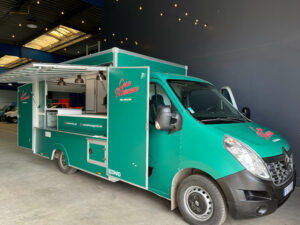Reading guide
In France, food trucks are subject to various legal obligations in order to operate properly. These obligations include, in particular, having to display a range of mandatory information to comply with regulations. These legal obligations aim to guarantee transparency and food safety for consumers.
Legal requirements for food trucks
Food trucks are subject to strict regulations in order to comply with the law. They must comply with a certain number of legal obligations to be able to operate their mobile catering business with peace of mind.
The main legal obligations
First of all, the manager of a food truck must hold a carte de commerce ambulant (itinerant trade card). This card, valid for 4 years, allows the operator to travel outside the commune in which he or she is domiciled. If an employee is hired, he or she must carry a copy of this card.
Secondly, training in food hygiene is compulsory if the entrepreneur does not have at least 3 years’ experience in the food sector as a manager or operator. Lasting a minimum of 14 hours, this training costs between €200 and €500.
Food truck owners must also comply with other essential rules, such as registering their business, taking out professional liability insurance and obtaining the necessary permits to park in public spaces.
Steps to comply with regulations
To be able to operate, the owner of a food truck must go through a number of formalities before launching his business.
Registration and declaration at the town hall
Before you can register your vehicle, you need to check that the flood truck is in order. The actual registration involves officially registering the food truck with the relevant authorities, providing the necessary documents such as proof of insurance, vehicle ownership certificate and permits obtained. This administrative procedure enables the food truck to be clearly identified, and certifies that it is legal to operate.
At the same time, a declaration must be made to the town hall at least 15 days before the business opens. This declaration informs the local authorities of the presence of the food truck on their territory.
Professional liability insurance
Professional liability insurance is an obligation for food truck owners. This insurance protects the restaurateur and his customers against accidents that may occur, whether material, immaterial or bodily. It covers damage caused by the food truck itself, as well as possible food poisoning. The cost of this insurance varies according to the cover chosen and the company’s sales figures.
Food hygiene training
All employers and employees handling food in a food truck are required to undergo food hygiene training. Lasting a minimum of 14 hours, this training covers basic hygiene rules, the cold chain, food storage, as well as good preparation and service practices. This training is not mandatory for entrepreneurs with at least 3 years’ experience in the food sector.
Parking permits
To operate in the public space, a food truck must obtain authorization from the relevant authorities. Depending on the location chosen, this may involve :
- A parking permit issued by the town hall for fixed sites on the communal public domain,
- Prefectoral authorization for sites located on a national or departmental road, or on certain major city arteries,
- A fixed or flying stall at a market, after registering with the vendor and paying the stall fee.
The rates and procedures for granting these permits vary from one commune to another, and from one location to another. It is therefore important to check with the relevant authorities well in advance.
Compulsory displays
To comply with current regulations, food truck owners must display a number of essential items of information to inform customers about the origin of products, hygiene rules and regulations governing the sale of alcohol.
Meat origin: crucial information
Since October 1, 2023, food trucks have been required to display visible and legible information on the origin or provenance of beef, pork, sheep and poultry. The information required depends on the animal’s place of birth, rearing and slaughter. This measure, already in force for traditional restaurants, is designed to improve consumer information.
Display hygiene rules to reassure customers
Food trucks are required to display hygiene rules, particularly for handling foodstuffs. This display informs both staff and customers of the best practices to follow to guarantee food safety.
The elements to be displayed include, for example :
- The obligation for staff to wash their hands regularly
- Food preservation rules (temperatures, use-by dates, etc.)
- Cleaning and disinfection procedures for surfaces and equipment
Selling alcohol: strict regulations to be complied with
The sale of alcohol is subject to specific rules. To sell alcoholic beverages before 10pm, all you need is a prior declaration. On the other hand, for sales between 10pm and 8am, you need to obtain an operating permit, also known as a night-time liquor license. This permit can be obtained following a 20-hour training course.
Food trucks selling alcohol must comply with regulations on public drunkenness and the protection of minors. This means that notices such as “It is forbidden to sell alcohol to persons under the age of 18” must be clearly visible.
Information about food
Although optional for the time being, the “fait maison” label is a valuable addition to a restaurateur’s business. It means that the dishes on offer are prepared or processed on the premises, using fresh or raw ingredients. The aim of this measure is to guarantee greater transparency for consumers, and to promote the expertise of restaurant professionals.
Signs and obligations for food trucks
Mandatory signage regulations for the owners of these itinerant businesses help to establish a climate of trust with customers by displaying the origin of meats, hygiene rules and regulations on the sale of alcohol. By ensuring that this information is visible and legible, food truck owners can be sure that they are operating in full compliance with the law.
Need more information?
Questions about your new truck?
Our team is there for you! We’ll answer all your questions and guide you every step of the way. Contact us today:
Our food trucks and store trucks
Our food trucks
Pizza truck - Snack truck - Chip truck - Creperie truck - Sushi truck - Thai truck - Catering truck - etc.
Our store trucks
Hairdresser truck - Grooming truck - Event truck - Mobile office - Advertising truck - Tattler truck - etc.
These articles may be of interest to you

Food truck layout process
Setting up a food truck requires careful organization and compliance with certain standards. To transform your truck into a real mobile restaurant, you’ll need to

Food truck layout process
Setting up a food truck requires careful organization and compliance with certain standards. To transform your truck into a real mobile restaurant, you’ll need to

Food truck layout process
Setting up a food truck requires careful organization and compliance with certain standards. To transform your truck into a real mobile restaurant, you’ll need to